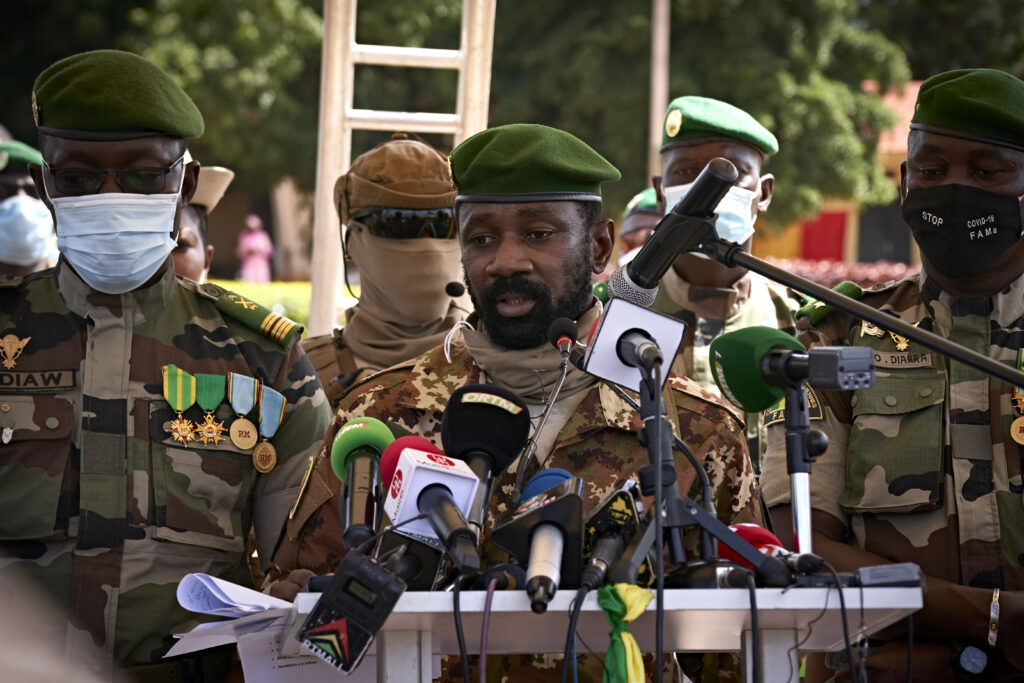Five years after taking power by force, Mali’s junta leader, General Assimi Goita, has abandoned his promise of a democratic transition, extending his military rule for at least five more years without an election.Goita, 41, burst onto the public scene as a young, relatively unknown military officer when he deposed president Ibrahim Boubacar Keita in an August 2020 coup.”We no longer have the right to make mistakes,” Goita said at the time, cutting a martial figure in fatigues with a khaki shemagh scarf around his neck, as he introduced himself to the public.Less than a year later the special forces commander launched a second coup, removing the two civilians who had been appointed under international pressure to steer Mali back to democratic rule.Then in June 2021, dressed in full military regalia, Goita took the presidential oath and promised to stand by Mali’s commitments.He was now in charge of a country mired in almost a decade of violence by jihadist groups affiliated with Al-Qaeda and the Islamic State group, as well as other criminal organisations.But he was celebrated in some quarters as a hero who might bring salvation to his troubled west African nation, particularly as he insisted on Mali’s commitment to the anti-jihadist fight and initially pledged a return to civilian rule.- No civilian rule -But Goita ultimately failed to make good on his promise to cede power to elected civilians, which was to occur by March 2024.The prospect came crashing down further Thursday, when the country’s military-appointed legislative body granted Goita a five-year presidential mandate, renewable “as many times as necessary” and without election.Under Goita, Mali continues to sink into an economic and security crisis, while jihadists and other criminals have only intensified their offensives, staging bloody raids and incursions.But there have been some successes: in November 2023, Mali’s army retook Kidal, a stronghold of separatists from the Tuareg ethnic group — a victory the junta presented as a decisive step in regaining territory.However, the army and its Russian mercenary allies are regularly accused of abuses against civilians.The junta has meanwhile suspended multiple media outlets, jailed opposition members and critics, and dissolved political parties.- ‘Man of action’ -Goita’s rule has marked a turning point in Mali’s relationship with the West.The country has broken ties with France and other former allies and pivoted toward Russia.The junta pushed out France’s anti-jihadist force in 2022 and the UN peacekeeping mission MINUSMA in 2023.Alongside Burkina Faso and Niger, which are also led by military juntas, Mali quit the Economic Community of West African States (ECOWAS) earlier this year, accusing the regional bloc of being subservient to colonial ruler France.The trio set up their own confederation called the Alliance of Sahel States (AES).The son of a former director of Mali’s military police, Goita studied at the country’s military schools.In 2002, he went to Mali’s desert north for training, and was subsequently based in the northern cities of Gao, Kidal, Timbuktu, Menaka and Tessalit.Goita saw action during a Tuareg independence rebellion in 2012, which was quickly commandeered by jihadists.Mali has since struggled to quell their brutal insurgency, which has killed thousands of people and forced hundreds of thousands more from their homes.Despite Mali’s multifaceted tumult, Goita remains popular with a segment of the population, which views him as an architect of reform and newfound sovereignty.A colonel who requested anonymity said Goita is not bothered by how people see him.”He’s a man of action — we saw that in the north,” he said.sd-lar-bdi-sjd/bfm/jhb
